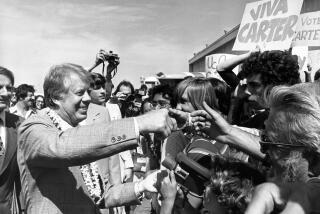Two Old Pols Knew the Art of a Bargain
- Share via
Controversy rages in Washington. But there is one fact in which agreement is universal: Between a majority of the people’s representatives and the people’s president, there is a continuing antagonism that makes civil communication almost impossible.
But “what if”? What if, frequently, President Clinton put his feet up on the coffee table on the second floor of the mansion with either the speaker of the House (or the majority leader of the Senate) lounging before him, chatting about where the nation ought to be heading. Not that either would change course or declare defeat. But the easy give and take of an informal conversation, some pieces of worthy programs might find daylight.
Looking back is usually not very fruitful, but I remember when it was different than it is now. When I was special assistant to President Johnson, he charged me with “handling” key members of the Senate and the House, which meant they could call me direct with grievances, needs, requests. I was authorized to use my best judgment in responding.
I bore personal witness to long-ago discourses wherein President Johnson and the minority leader of the Senate, Everett Dirksen of Illinois, would sip a drink, field some little joke that poked fun at each other and do the nation’s business. Dirksen, the Republican leader, would call me around noon in that voice dipped in cream and ladled out in large velvet spoons, deep, sonorous tones to soothe even the most obsessively discontented. “Jack, would you tell the boss I would like to see him today. Possible?” Without hesitation, “Absolutely, Senator. You want to come by around 6 o’clock for a drink with him?” The appointment was sealed, and I so informed the president.
At 3 o’clock that afternoon, Dirksen would rise on the Senate floor and flail LBJ with a rhetorical whip, comparing him unfavorably to Caligula. Three hours later, the two would gather in the West Hall in the living quarters of the president, with me as observer.
“Dammit, Everett, the way you treated me today made me feel like a cut dog. You ought to be ashamed of yourself,” the president would say with a mocking grin. “Well, Mr. President,” came The Voice, trying in vain to suppress a chuckle, “I have vowed to speak the truth so I had no choice in the matter.” Much laughter. They both knew who they were and why they were leaders. They were two warriors who had fought a hundred battles against each other. They knew the game, how it was played, no quarter given, no quarter asked in the public arena. But when the day was done, they sat around the campfire, as it were, to recount the details of the fight over a flagon of fine refreshments. They both knew that each needed the other, and the country needed them both. If they fumed and fussed, determined to wound and kill the other, no ultimate good would come of it. The land they served would be agitated and stunted by stalemate. They both understood the meaning of “duty” to the nation, and they knew that compromise was not an ignoble word.
The president would say, “Now, Everett, I need three Republican votes on my civil rights bill, and, dammit, you can get them.” Dirksen would ponder that somberly, and then pull a sheaf of papers out of his inside pocket. “I have here, Mr. President, some potential nominees to the FCC, the ITC, the SEC” and so on through the catalog of acronyms wherein the nation’s regulatory labors get done.
LBJ would sigh, and say, “Jack, take down the names and see if Mr. Hoover (J. Edgar) will certify them.” Dirksen would smile broadly, sip his drink. LBJ would do the same. After more intimate joshing between them, Dirksen would depart. There was no mention of a deal. There was no formal commitment. But each knew the pact was struck. Each would redeem the unspoken pledges given. And there was no leakage to the press. Moreover, the warriors’ code was intact. Neither gloated in a supposed triumph over the other.
By whatever mutations the gods of politics brew, there has to be a return to political civility, whose end result is to the nation’s benefit. Neither LBJ nor Sen. Dirksen lost their honor or abandoned their crusades when they talked. Nor did they lose their bearings. For they knew such damage would diminish them both, and most of all the country, whose people they had by solemn oath sworn to serve, would be the loser. They did their duty.
More to Read
Get the L.A. Times Politics newsletter
Deeply reported insights into legislation, politics and policy from Sacramento, Washington and beyond. In your inbox twice per week.
You may occasionally receive promotional content from the Los Angeles Times.










